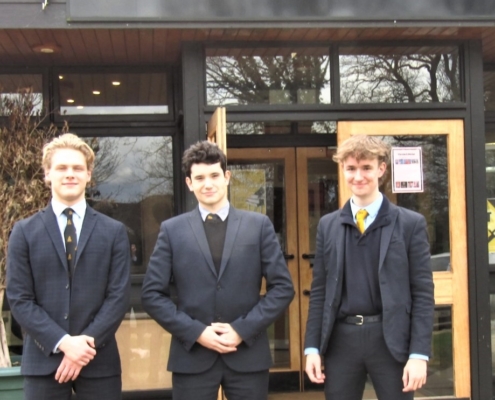A Good Nights Debating For Bishop’s Stortford
A Good Nights Debating For Bishop’s Stortford
Hard on the heels of mock A Levels and Oxbridge/medical school interviews the TBSHS ESU Mace team faced what looked like a difficult task in the second round, with only 2 teams from a strong field of 6 to go through to the next stage of the competition.
The first debate featured Hertfordshire & Essex High School, led by Freya Queeney, proposing that “This House Would use Proportional Representation in UK national elections”. Herts & Essex argued that ‘first past the post’ leads to lack of choice and wasted votes, with the Single Transferable Vote system as their preferred alternative. Their opponents from the Perse School who, I felt, were less impressive than in the first round, responded by stating that PR would favour extremist candidates, be unpopular and make MPs less locally accountable.
In the second debate, Chancellor’s School from Hatfield proposed the motion that countries with poor human rights records should not be allowed to host sporting tournaments. Their first speaker pointed out that all countries have signed the United Nations Declaration of Human Rights and went on to inform the audience about several other similar documents, with no real reference to the effects of implementing the motion. In response Tom Millar explained, with references to several countries, why sports bans/boycotts do not cause improvements in human rights. When challenged about the end of apartheid in South Africa, he responded extremely well and went on to pose some searching questions that our opponents never really answered. Tom argued that real change comes from collaboration rather than coercion. 
The second proposer followed a similar line to his teammate, still maintaining the success of banning sporting contacts with South Africa, and also described the Qatar World Cup as “morbid”. Georgi Petkov’s concentration on the morality of the motion complemented Tom’s focus on the practicalities very well. After some effective rebuttal about the difference between a country signing up to a human rights charter and influencing the hearts and minds of its citizens, he went on to explain how the motion embodies the principle of colonial exceptionalism and to observe that sustainable change stems from pressure within a society, not threats from outside. After a short floor debate, Toby Ford offered a very well-balanced summary speech against the motion. He answered audience questions convincingly and identified the nature of human rights and the question “Which side of this debate is more likely to improve those rights?” as key themes of the debate. Describing the Proposition case as “misguided”, he demonstrated why his team’s arguments had prevailed.
The final debate of the evening featured another very familiar motion – “This House Would abolish trial by jury”, proposed by Longsands Academy (St Neots) supporting the motion against Colchester County High School for Girls. The former proposed the replacement of a jury by a panel of three judges, arguing that they would be less biased and less easily swayed by lawyers’ rhetoric than jurors. The Opposition focussed their arguments on the idea of jury service as a civic duty that benefits all citizens, as well as pointing out that a jury of 10 or 12 members of the public would hold a wider, and therefore more representative set of opinions than three judges who, statistics suggest are likely to have been privately educated.
It was not easy to predict which two schools would progress to the next round and, after the judge’s preliminary general feedback, we were not at all confident that TBSHS would be one of them. However it turned out to be a great night for Bishop’s Stortford, with both TBSHS and Herts & Essex winning out.
Retired teacher and team coach Tony Fraser commented , “It was a close-run thing, but the school is safely through to our ninth successive Regional Final in this competition. The students had only finished their mock A Level exams a few days before, but they really rose to the occasion and were praised for the clarity of their arguments and the confident manner in which they presented them”



